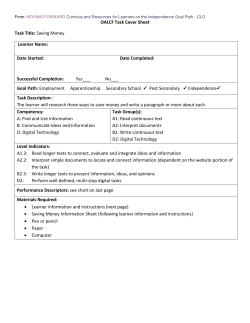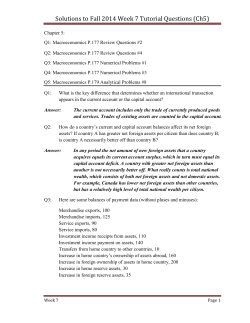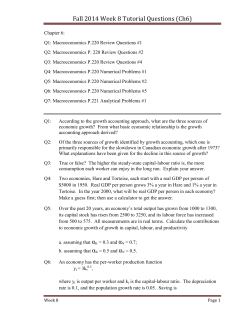
How To Save Smarter $AVINGS SURVIVAL GUIDE
PARADE Magazine | How To Save Smarter 1 of 2 http://www.parade.com/news/2009/05/how-to-save-smarter.html Login | Register | FREE NEWSLETTER - CLICK HERE ENTER TODAY FOR A CHANCE TO WIN $50,000! INTELLIGENCE REPORT | WHAT PEOPLE EARN | DICTATORS | WHERE AMERICA LIVES | PHOTO GALLERIES | 1 of 1 $AVINGS SURVIVAL GUIDE How To Save Smarter by Tim Harford published: 05/10/2009 Not very long ago, Americans were terrible savers. In 2007, the average person put aside 60 cents of every $100, or .6% per paycheck. However, the current economic downturn has shocked us into depositing more at the bank. As of February, the personal savings rate was more than 4%. That’s a big improvement, but it’s still half of 1980s levels, when Americans routinely socked away 10% of their paychecks. Why is saving so hard? And how can we be smarter savers? Behavioral economists—researchers who mix psychology and economics—have uncovered three reasons why people find it so difficult to save. The first is temptation: Although we often later regret it, we just can’t resist spending. The second is lack of understanding: Our brains can’t quite grasp the profitability of saving. The third is optimism: We believe that everything will work out, even if we don’t save. Fortunately, researchers have found solutions to these problems. Temptation can be countered if you make saving as much fun as spending. This isn’t such a stretch. Neuroeconomist Ben Seymour of University College, London, sits in front of a brain scanner and watches what happens in our heads when we think about financial decisions. He found that imagining a future purchase is almost as good as getting it. For example, when we daydream about buying a new car, our brains respond in much the same way as when we actually make the purchase. We can harness this buzz to our benefit by discarding vague ideas of “saving for a rainy day” and focusing instead on particular items we need or want. “Saving is much easier when it’s for something specific,” Seymour says. Reinforce this connection in your mind by opening a different savings account devoted to each of your goals: one for a new car, one for a vacation, one for a child’s college tuition fees. Or try this effective technique: Remind yourself to save whenever your paycheck comes. Write messages in your calendar or set up your computer or e-mail program to give you periodic prompts. Dean Karlan, an economist at Yale, has tested this method in experiments in countries such as the Philippines and Bolivia. He discovered that even low-income bank customers managed to deposit some of their wages when they were nudged to do so by regular text messages. “That beats the argument that people just don’t have the money,” Karlan explains. Researchers Jonathan Zinman of Dartmouth College and Victor Stango of the University of California, Davis, have discovered another reason that we don’t save: We forget about the power of compound interest—how, say, $10,000 invested at a 5% interest rate will almost triple in 20 years. “Almost everyone severely underestimates how much interest they can earn on their savings,” Zinman says. The same cognitive glitch applies to how we think about debt. Millions of Americans pay interest rates of 20% or more on their credit-card balances, and these high rates will make even a modest amount quickly balloon. Never under-estimate how much debt costs and how much your savings can grow. Richard Thaler, a professor and behavioral economist at the University of Chicago, is convinced that there’s just one way to save. “Having an amount automatically deducted from your paycheck is the only thing that succeeds,” he says. “If we have to decide with every paycheck how much we should put aside, the answer is often zero.” However, all of this research on better ways to save does not shed light on why such large numbers of Americans were steady savers in the past and why so many gave up on the practice. Economists Ulrike Malmendier of the University of California, Berkeley, and Stefan Nagel of Stanford believe that our attitudes toward risk are strongly shaped by the economic conditions we experienced when we were teenagers or young adults. Over the last two decades, stock prices rose strongly and downturns were relatively gentle. As a result, those who grew up during this period became optimistic about future investments and willingly took big risks. Older investors, shaken by the poorly performing stock market of the 1970s, acted with much more caution. 6 More Ways to Grow Your Nest Egg » Thanks to the present financial turmoil, today’s teenagers will probably have much less trouble saving when they hit adulthood. They’ll have seen firsthand that saving is not about using your money to invest and make a killing on stocks or real estate; it’s about putting some of your money safely aside in an uncertain world. That’s a lesson we should all start to learn. Tim Harford, a “Financial Times” columnist, is the author of “The Logic of Life,” available in paperback. 1 of 1 Keyword Search: money saving finance psychology economist 5/11/2009 5:13 PM PARADE Magazine | How To Save Smarter 2 of 2 http://www.parade.com/news/2009/05/how-to-save-smarter.html Open a Checking Account Dr. Oz's Free Test Use Your Sovereign CheckCard and Receive $100 Cash Bonus. Apply Now. Millions have already taken this amazing test. What's your RealAge? Add Comment | Total: 2 Saving Tips by pedersoc posted: 05/11/2009 02:50:PM I have lots of savings tips on my website under Savings Swappers http://www.SwapSavers.com/ REPLY | Number of replies:0 How to Save Smarter? by Brian posted: 05/10/2009 10:52:AM If you save based on emotion like the article implies, you'll never make it. It'll be like going on a fad diet, or getting high from a drug, or getting jailhouse religion. It'll be temporary fix that (probably) won't last until the next one. The study cited doesn't explain why people in similar economic conditions and/or similar upbring save differently. With my 4 siblings for example -- all of us baby boomers -- our savings are all over the spectrum (with me being the most extremely -- maybe to a fault). Bottom-line is, the best way to save is to have the money taken out up front, not even thinking about it -- then, use the rest that you take home to live the way you need/want. As for today's teenagers and young adults, I'd bet that they won't learn their lesson any better than their parents did. (I can see that based on their current spending patterns. That's what sets the pattern and basis for what they'll do as adults.) REPLY | Number of replies:0 MORE FROM PARADE Dancing With the Stars Quiz Tom Hanks: No 'Smooching' in PARADE.COM Home Contact Us About Us Media Relations Advertising Info Former 'Bachelor' Stars CELEBRITY Interviews Photo Galleries Quizzes 6 Ways to Grow Your Nest Egg HEALTH & FOOD Health Food & Recipes Fitness Photo Galleries 5 Ways to Get Your Kids Moving SPECIAL REPORTS Intelligence Report What People Earn Dictators Where America Lives Photo Galleries Ready or Not, It's Conan's Turn MAGAZINE This Week’s Issue Past Issues Partners: Abilene Reporter-News : AL.com : Albany Democrat-Herald : Albuquerque Journal : Arizona Daily Star : Arkansas Democrat Gazette : Billings Gazette : Calkins Newspapers : Cape Coral Daily Breeze : Centre Daily Times : Cleveland.Com : Corvallis Gazette-Times : Daily Reporter : Dayton Daily News : Denver Post : Hoosier Times : Idaho Press : Independent Mail : Kansas City Star : Lehighvalleylive.com : Mankato Free Press : Masslive.com : Milive.com : Minot Daily News : Modesto Bee : News & Record : Nj.com : Nola.com : Oregonlive.com : Pennlive.com : Pittsburgh Post-Gazette : Press Democrat : Quad City Times : Reading Eagle : Salem News : San Francisco Chronicle : Santa Fe New Mexican : Se Missourian : Silive.com : South Bend Tribune : St. Joseph News-Press : St. Louis Post-Dispatch : Standard-Times : Star News : Sunday News Register : Syracuse.com : The Advocate : The Bakersfield Californian : The Baltimore Sun : The Charlotte Observer : The Fresno Bee : The Gazette : The Herald-Mail : The Journal : The Lacrosse Tribune : The Leader-Herald : The Maui News : The Messenger : The Miami Herald : The Mining Journal : The News-Sentinel : The Oklahoman : The Olympian : The Parkersburg News : The Record : The Repository : The Review : The Roanoke Times : The Sacramento Bee : The Salina Journal : The News Tribune : The Telegram : The Wichita Eagle : The Valdosta Daily Times : Times-Republican : Tribune Star : Virginian Pilot : Williamsport Sun-Gazette Sister Sites: Allure : Architectural Digest : Brides.com : Bon Appétit : Concierge : Condé Nast Traveler : Cookie : Details : Domino : : Glamour : Gourmet : GQ : Golf Digest : Golf for Women : Lucky : men.Style.com : NutritionData : Portfolio : Self : Style.com : Teen Vogue : The New Yorker : Vanity Fair : Vogue : Wired.com : WWD.com : W Magazine Copyright 2009 ParadeNet, Inc. All rights reserved. The material on this site may not be reproduced, except for personal, non-commercial use, and may not be distributed, transmitted, cached or otherwise used except with the prior written permission of ParadeNet. Use of or registration on this site constitutes acceptance of our User Agreement and Privacy Policy (updated 1/10/2008). 5/11/2009 5:13 PM
© Copyright 2025





















